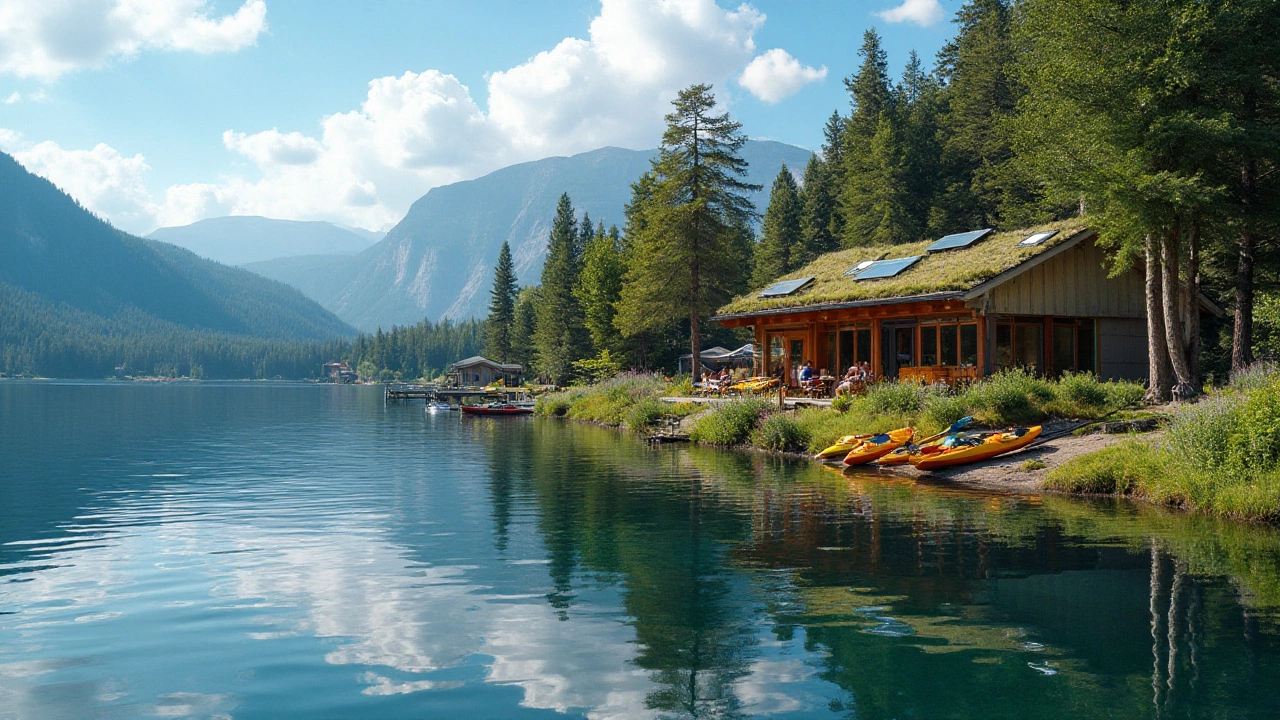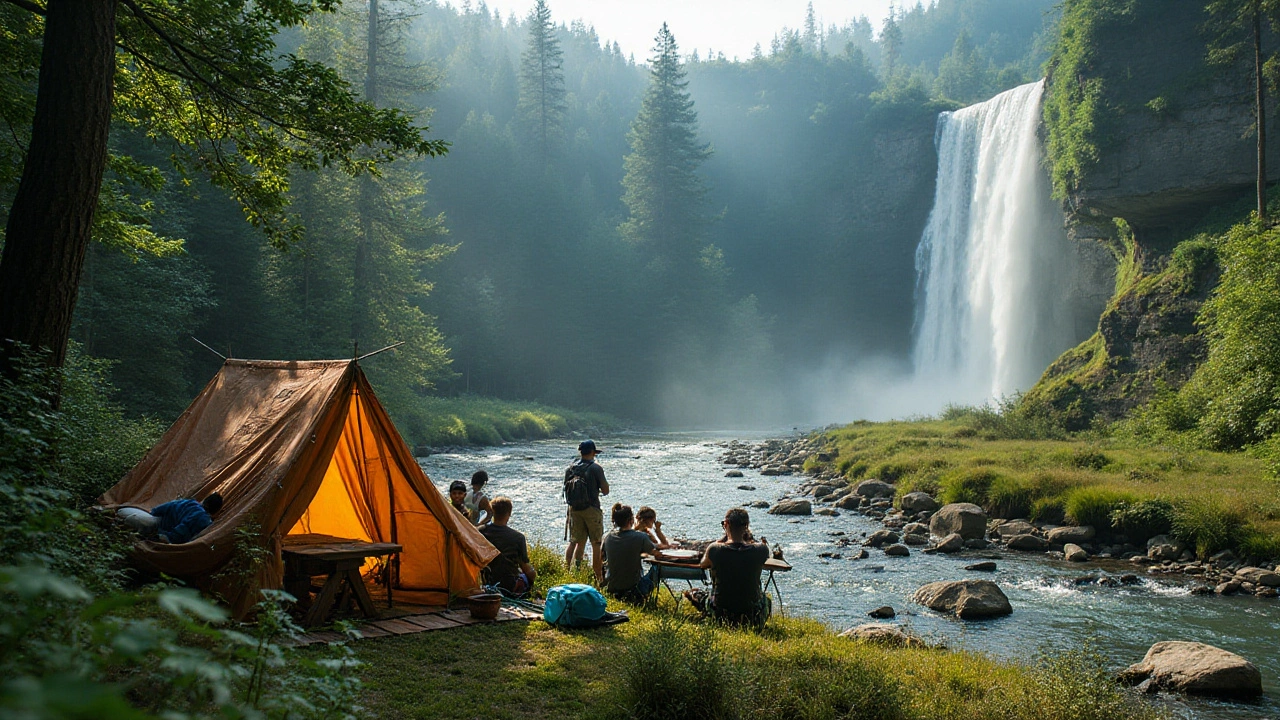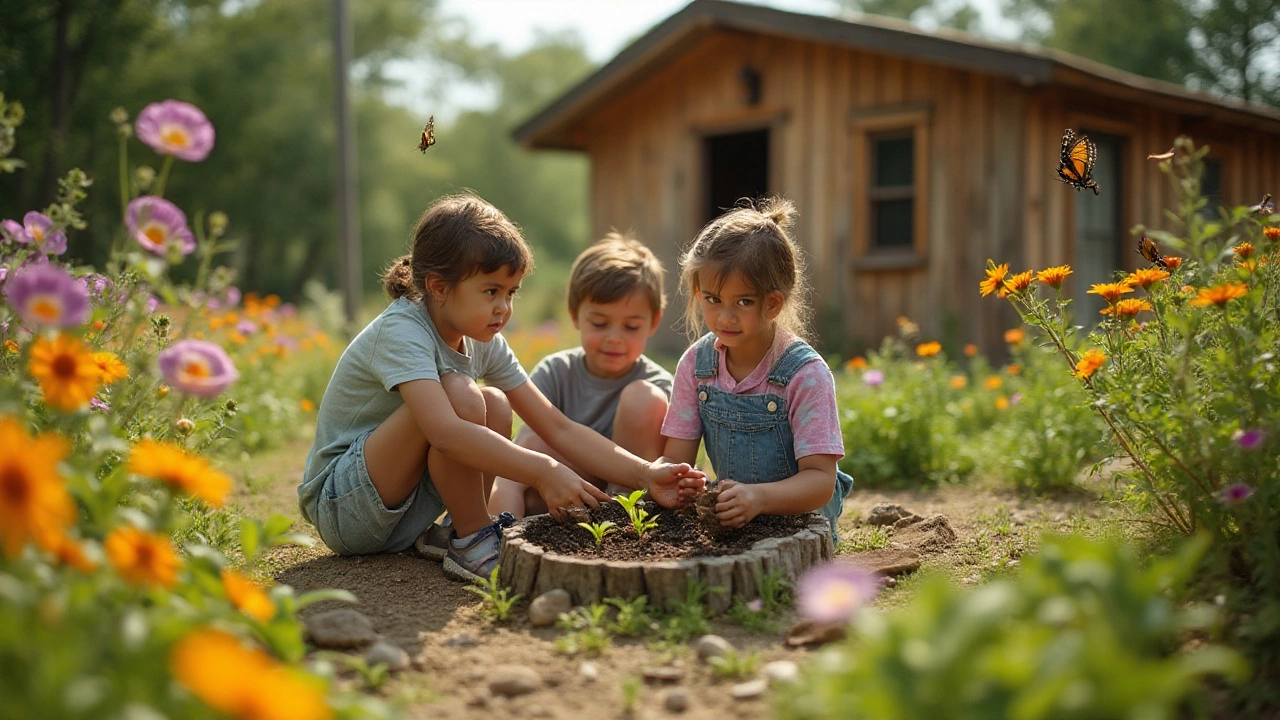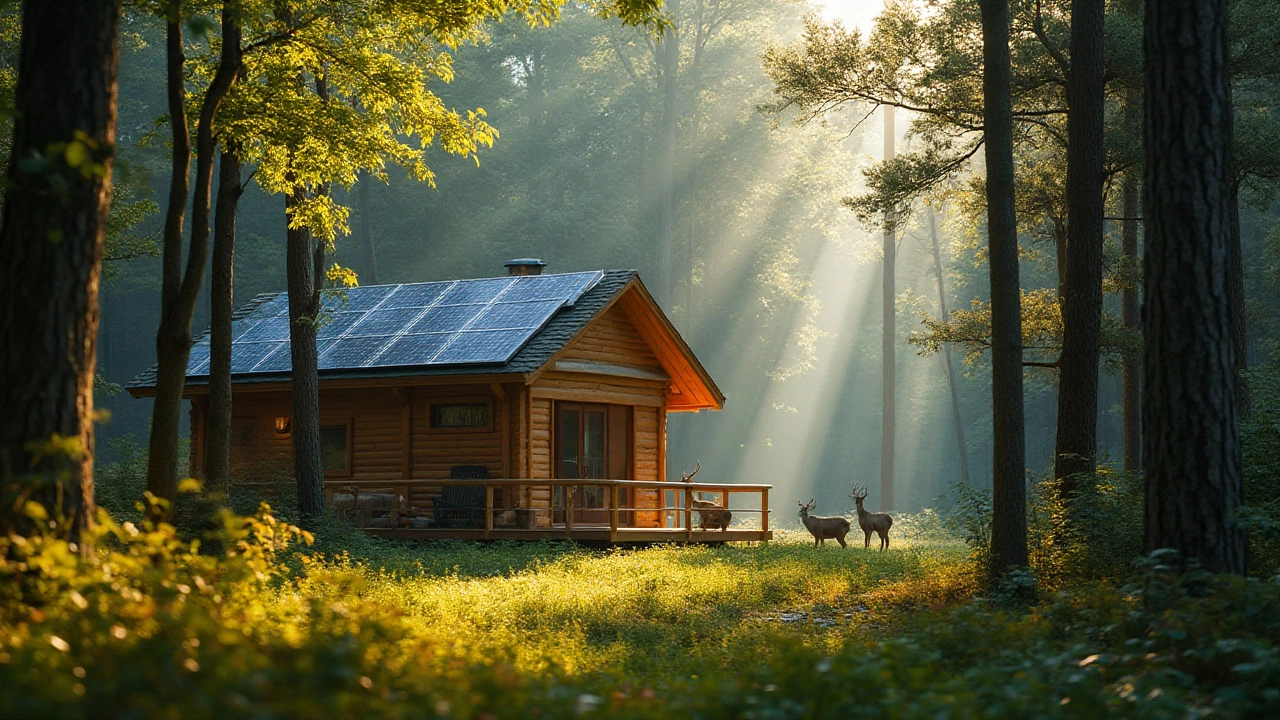In recent years, the demand for eco-friendly cottages has surged as more travelers seek to align their vacation choices with sustainable principles. People are increasingly aware of their environmental impact, and this consciousness is reflected in the places they choose to stay.
From the misty shores of the Pacific Northwest to the serene landscapes of New England, the United States is home to numerous green retreats that promise a minimal ecological footprint without sacrificing comfort or charm. These cottages often utilize renewable energy sources, promote recycling, and embrace sustainable building materials to ensure an eco-conscious stay.
Whether you're drawn to the idea of lounging in a solar-powered cabin surrounded by the tranquility of nature or exploring the biodiversity in a backyard garden, there are options that cater to every kind of green traveler. As you plan your next getaway, consider these eco-friendly retreats that not only offer a peaceful respite but also contribute to a healthier planet.
- The Rise of Eco-Friendly Cottages
- Top Green Destinations in the USA
- Unique Features of Sustainable Retreats
- Tips for Choosing Your Eco-Friendly Stay
The Rise of Eco-Friendly Cottages
The recent surge in popularity of eco-friendly cottages is more than just a trend; it's a testament to the growing awareness about sustainable living and the desire for a deeper connection with nature. This movement is sweeping across the nation as more people realize the impact of their lifestyle choices on the environment. As the effects of climate change become increasingly tangible, from devastating wildfires to erratic weather patterns, individuals are determined to make changes in their daily lives—even when they travel. Eco-friendly accommodations are a reflection of this shift in consciousness, providing comfort without compromise.
One significant factor driving this rise is the increasing number of travelers who prioritize sustainability. According to a study by Booking.com, 83% of global travelers think sustainable travel is vital, with 61% saying that the recent pandemic has made them want to travel more sustainably in the future. This attitude is mirrored in the preferences for accommodation, with a notable increase in the selection of eco-friendly stays. Cottages that minimize their environmental footprint by incorporating solar panels, green roofs, and geothermal energy are becoming more mainstream.
Another compelling reason for the growth of this sector is technological advancements. Renewable energy solutions have become more affordable and efficient, making it easier for cottage owners to implement eco-friendly practices. The burgeoning field of biomimicry has also contributed, as architects draw inspiration from nature to design sustainable structures that harmonize with their surroundings. Such technologies not only reduce energy consumption but also improve the guest experience by offering a unique stay that doesn’t sacrifice modern conveniences.
"We must shift from isolating ourselves from the natural world to living as a part of it," says environmentalist and author David Suzuki, emphasizing the ethos that eco-friendly cottages embody.
Eco-friendly accommodations are not just popular in remote areas or national parks. Urban centers are also seeing a rise in sustainable buildings and accommodations, reflecting a broader societal shift. As more Americans seek respite from the hustle and bustle of city life, they are opting for getaways that not only relax the mind but also ease the conscience. In response, the hospitality industry is investing in greener practices, recognizing the commercial potential of environmentally responsible tourism.
Today, sustainable travel options are more accessible than ever before. More eco-cottages are popping up in diverse locations, from tranquil lakeside retreats in the Midwest to the sun-drenched coasts of California. Each location offers its own blend of natural beauty and innovative sustainability, inviting guests to explore local practices that demonstrate a commitment to preserving the environment. This emphasis on local culture and eco-preservation allows coast-to-coast travelers to enjoy their green retreat whilst making a positive impact on the area they visit.

Top Green Destinations in the USA
When it comes to escaping into nature's embrace with a commitment to sustainability, the United States offers an incredible array of options. From the towering forests of the Pacific Northwest to the sun-dappled shores of New England, these regions proudly host some of the greenest, most eco-friendly cottages in the country. The appeal of these destinations lies not only in their breathtaking landscapes but also in the ethos of sustainable living that they embody. Take Oregon's picturesque Crater Lake, for instance, where accommodations are designed to blend seamlessly into the stunning scenery, incorporating solar panels and rainwater harvesting systems. Visitors to this area often praise its commitment to wildlife preservation and habitat restoration, making it an exemplary choice for nature lovers who wish to minimize their ecological footprint.
Further south, California's Big Sur region beckons with its rugged coastline and towering redwoods, offering a refuge for those eager to connect with both land and sea. Here, sustainable travel is not just a trend but a way of life, with many cottages providing composting toilets, using solely local and sustainable materials, and fostering biodiversity through native landscaping. According to a report on sustainable tourism, guests in this area have been reported to leave overwhelmingly positive reviews, noting the unique ability of these accommodations to offer luxury without compromising environmental responsibility.
Traveling eastward, the Great Smoky Mountains present a surprising gem of green innovation amidst their misty, verdant expanses. Dotted with eco-retreats that prioritize green certification and energy conservation efforts, this national park is a testament to the transformative power of eco-conscious architecture. Guests can enjoy lodgings that offer geothermal heating and cooling systems, ensuring a comfortable stay while reducing traditional energy reliance. In addition, the area supports vibrant local communities that provide organic produce, artisanal crafts, and eco-friendly services to visitors. A portion of the proceeds from such offerings often goes back into conservation efforts, highlighting a well-rounded approach to tourism that supports the environment and local economy alike.
"The future of travel rests in how we choose to preserve the pristine natural landscapes we are drawn to," says Jane Doe, a renowned environmental author, emphasizing the pivotal role that sustainable travel plays in today’s world.
In New England, the tranquil landscapes of Vermont offer another beacon of sustainable hospitality, drawing guests with their charming blend of rustic elegance and modern green technologies. Vermont is renowned as a pioneer in organic farming and environmentally-friendly practices, making it a prime location for eco-friendly cottages. Many of these retreats feature innovative designs such as living roofs, sunlight-maximizing architecture, and eco-conscious insulation. The result is an immersive experience where guests can enjoy sprawling vistas and idyllic forests while knowing that their stay supports both local communities and nature's preservation.
The diversity of green destinations across the USA offers something for every type of traveler eager to reduce their carbon footprint while enjoying unique environments and cultures. With each option, there is a shared commitment to environmental stewardship, making these eco-friendly cottages a smart choice for those who cherish sustainable travel and wish to experience the world's wonders responsibly.

Unique Features of Sustainable Retreats
Sustainable retreats have expanded beyond the simple concept of eco-friendly practices to embrace a holistic approach, blending luxury with sustainability to offer a fulfilling experience for travelers. One of the most captivating features of these retreats is their use of sustainable building materials. Many eco-friendly cottages are intentionally crafted with locally sourced, renewable materials such as bamboo, reclaimed wood, and natural stone, which help reduce the carbon footprint associated with long-distance transportation of materials. This thoughtful design not only creates aesthetically pleasing spaces that blend harmoniously with their natural surroundings but also ensures longevity and resilience to environmental challenges.
Another distinctive feature is the focus on energy efficiency and renewable resources. Many retreats are equipped with solar panels to harness the sun's energy, providing power for electrical needs without relying on fossil fuels. Some retreats take it a step further by integrating geothermal heating and cooling systems, which use the earth's natural temperatures to regulate indoor climates, significantly cutting down energy usage. Water conservation is also a key component, with systems in place to harvest rainwater or recycle grey water for irrigation and utility purposes, ensuring that every drop is utilized with care and purpose.
The commitment to reducing waste is also evident across sustainable retreats. Many properties encourage guests to participate in waste reduction efforts through comprehensive recycling programs. Cooking and meal preparation often highlight farm-to-table dining experiences, using fresh, organic produce grown in onsite gardens or sourced from local farms, minimizing the carbon footprint involved in transporting food. This not only supports local economies but also provides guests with premium dining experiences that are as delicious as they are eco-friendly. These retreats also frequently feature composting facilities, turning kitchen scraps into nutrient-rich soil that cycles back to nourish gardens.
Many eco-retreats offer educational experiences to enhance guest understanding of sustainable practices. Workshops and tours might be available to demonstrate permaculture techniques, renewable energy systems, or organic farming. These hands-on experiences deepen the guest's appreciation for living green and potentially inspire changes long after their stay. A notable mention is that some retreats—like the famed cabins in the Redwoods of California—have been noted for their interactive environmental programs.
"Our goal is to leave guests with a greater understanding of sustainable living practices," shares Jane Hadley, founder of a popular eco-retreat. "We believe in empowering individuals to make environmentally-friendly choices in their everyday lives."
The immersive experience at eco-friendly retreats often includes guided nature tours or wildlife safaris in preserved natural habitats, allowing guests to connect deeply with the environment. Whether it's a biodiverse rainforest trek or a serene kayak excursion on a pristine lake, these activities are designed to foster a profound appreciation for the natural world while ensuring minimal impact on it. This enriching interaction with nature often leads to a lasting bond with and advocacy for environmental conservation efforts, creating lifelong champions for the earth's various ecosystems and all its inhabitants.

Tips for Choosing Your Eco-Friendly Stay
As the awareness of environmental issues grows, many travelers seek accommodations that reflect their commitment to green living and sustainability. Finding the perfect eco-friendly cottage is a rewarding experience, but it can be challenging with so many options available. One of the first steps in selecting the right retreat is to determine what sustainability means to you. Do you prioritize renewable energy use, waste reduction, or water conservation? Identifying these priorities will help you focus your search on the features that matter most to you.
Look for cottages that have earned certifications from reputable environmental organizations. Certifications often indicate that a property adheres to stringent sustainability practices. Organizations such as LEED (Leadership in Energy and Environmental Design) or Green Key Global provide such certifications, ensuring minimum impact on the environment. Investigating a property's commitment to conservation can also provide insights into their environmental ethos. Often, eco-friendly cottages incorporate local materials in their construction, reducing transportation emissions and supporting local economies.
Consider the property's energy sources. Many sustainable retreats utilize solar panels or wind turbines to power their facilities. In recent years, there has been an increased focus on achieving energy self-sufficiency in eco-cottages, making renewable resources a top choice. Exploring whether a retreat offsets its carbon emissions might also reveal its dedication to eco-conscious practices. Some properties go as far as to plant trees or support renewable energy projects to counterbalance their operational emissions.
“Incorporating sustainable practices into our hospitality services has been immensely rewarding, both for our guests and the environment,” shares Emily Thompson, a renowned eco-travel consultant.
Water conservation is another crucial aspect to evaluate when choosing an eco-friendly stay. Cottages that implement rainwater harvesting systems or employ greywater recycling are taking effective steps toward sustainable water management. Low-flow fixtures and water-efficient gardens exemplify practical measures embraced by many green accommodations. Some retreats even feature composting toilets or natural ponds for wastewater treatment, showcasing their commitment to minimizing water waste.
Finally, examine the retreat's approach to waste management. Check if the property supports composting, recycling, and minimal use of single-use plastics. Many properties strive to be zero-waste, which involves intricate planning and strong adherence to eco-friendly principles. When properties promote locally grown food in their restaurants, it's a signal of their commitment to sustainability. This practice not only cuts down on carbon emissions from transporting food but helps bolster the local economy, creating a positive impact on the community. Relying on organic, local, and seasonal produce is a hallmark of true sustainability in travel.
